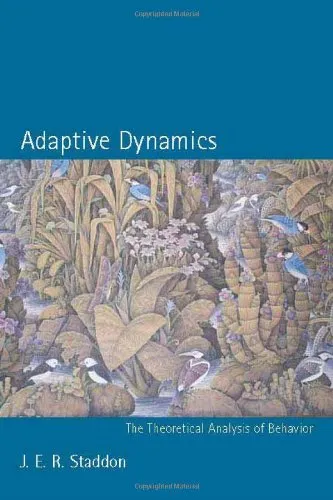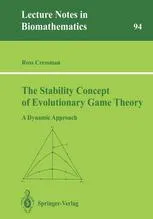Adaptive Dynamics: The Theoretical Analysis of Behavior
4.0
بر اساس نظر کاربران

شما میتونید سوالاتتون در باره کتاب رو از هوش مصنوعیش بعد از ورود بپرسید
هر دانلود یا پرسش از هوش مصنوعی 2 امتیاز لازم دارد، برای بدست آوردن امتیاز رایگان، به صفحه ی راهنمای امتیازات سر بزنید و یک سری کار ارزشمند انجام بدینکتاب های مرتبط:
معرفی کامل کتاب "Adaptive Dynamics: The Theoretical Analysis of Behavior"
کتاب "Adaptive Dynamics: The Theoretical Analysis of Behavior" نوشته "J. E. R. Staddon" یکی از آثار برجسته در زمینه تحلیل نظری رفتارهای تطبیقی است. این کتاب ترکیبی از اصول زیستشناسی، روانشناسی، و نظریههای ریاضی را ارائه میدهد تا پایهای نظری برای درک رفتارهای پویا و سازگارانه موجودات زنده ایجاد کند. این اثر بهصورت گسترده در محافل علمی مورد توجه قرار گرفته و الهامبخش بسیاری از پژوهشها در زمینه تحلیل رفتارهای پیچیده بوده است.
خلاصهای از کتاب
کتاب "Adaptive Dynamics" به تحلیل فرایندهایی میپردازد که از طریق آنها موجودات زنده رفتارهای خود را بر اساس تغییرات محیطی و نیازهای تکاملی تنظیم میکنند. نویسنده از یک رویکرد بینرشتهای استفاده میکند و با بهرهگیری از ابزارهایی مانند mathematical modeling و behavioral experiments، روابط میان محرکها و پاسخهای رفتاری را بررسی میکند.
از موضوعات اصلی مورد بحث میتوان به یادگیری، تصمیمگیری، و پویاییهای تکاملی اشاره کرد. این کتاب به طور خاص به تشریح مکانیزمهای internal models میپردازد که توسط آنها موجودات زنده قادر به تطابق با الگوهای محیطی جدید میشوند. از دیدگاه نویسنده، این فرایندها هم از نظر زیستی و هم از نظر شناختی اهمیت دارند.
یکی دیگر از مباحث کلیدی در این کتاب بررسی اصول Reinforcement Learning و تأثیر آن بر رفتارهای کلی موجودات است. نویسنده به دقت توضیح میدهد که چگونه فرآیندهای تقویت میتوانند رفتارها را شکل داده و در طول زمان بهینهسازی کنند.
نکات کلیدی و دستاوردهای مهم
- ارائه یک چارچوب منسجم برای تحلیل رفتارهای تطبیقی.
- استفاده از modeling ریاضی برای پیشبینی رفتارهای پویای زیستی.
- بررسی رابطه میان external environment و تغییرات behavioral dynamics.
- تأکید بر اهمیت یادگیری و تقویت در فرایندهای رفتار تطبیقی.
- ترویج رویکرد بینرشتهای به مطالعه رفتار موجودات زنده.
جملات معروف از کتاب
"The study of adaptive dynamics provides a unique window into how organisms survive and thrive amidst continual change."
"Behavior is the interface between an organism and its environment, constantly shaped by evolution and experience."
"Internal models are not just reflections of the environment; they are tools for survival and adaptation."
اهمیت این کتاب
کتاب "Adaptive Dynamics" به دلیل ترکیب منحصربهفرد مفاهیم زیستشناسی، ریاضیات، و روانشناسی شناختی از اهمیت ویژهای برخوردار است. این اثر نهتنها برای پژوهشگرانی که علاقهمند به تحلیل رفتارهای پیچیده هستند بلکه برای دانشجویانی که به دنبال یک چارچوب نظری برای مطالعه رفتار موجودات زندهاند، منبعی الهامبخش محسوب میشود.
از دیگر دلایلی که این کتاب را ارزشمند میکند، توضیحات شفاف و جامع در مورد مفهوم dynamical systems است که نقش مهمی در درک پویاییهای رفتار تطبیقی ایفا میکند. با برجسته کردن مسائل تکاملی و محیطزیستی، این کتاب به ما کمک میکند تا درک بهتری از رفتارهای انسانی و حیوانی داشته باشیم.
Introduction to Adaptive Dynamics: The Theoretical Analysis of Behavior
Welcome to Adaptive Dynamics: The Theoretical Analysis of Behavior, a thought-provoking exploration of the principles underlying how organisms, both human and non-human, adapt and respond to their environment. Written by J. E. R. Staddon, this book delves into the interplay between behavior, evolution, and the theoretical frameworks used to understand these dynamic systems. It combines scientific rigor with intuitive interpretations to build a foundational understanding of adaptive behavior.
Throughout this in-depth volume, I aim to clarify critical questions about behavior: How do living creatures adapt to changing environments? What mechanisms drive these adaptations? Fundamentally, the book examines behavior not as a static property but as a dynamic and ever-evolving process shaped by ecological demands, individual learning, and evolutionary pressures. Whether you're a psychologist, biologist, or philosopher of science—or simply someone curious about behavior—the theory-rich content in this text will enrich your understanding of life's adaptive processes.
Detailed Summary of the Book
Each chapter of Adaptive Dynamics sheds light on the interplay between theory, experimentation, and evolutionary explanations of behavior while fostering a critical approach to traditional concepts.
The book is divided into thematic sections. It begins with foundational principles, covering the historical context of behavioral study and introducing readers to the theoretical frameworks of adaptive dynamics. Early chapters lay the groundwork by addressing key theories—ranging from operant conditioning to more complex models of feedback control found in systems theory.
Building on these foundations, subsequent sections explore real-world adaptations in animals and humans alike. From the precise mechanisms behind learning models to the computational analysis of behavior, the book navigates through topics such as temporal behavior (timing and rhythm), feeding strategies, decision-making processes, and the role of reinforcement in shaping adaptive actions.
One of the core themes of the book is the recognition of optimality and how behaviors often appear to be the "best solution" for survival. However, rather than treating optimality as static, I dive into the nuances of how behaviors emerge, adapt, and stabilize in light of environmental variability and constraints.
The book culminates by addressing the broader implications of these behavioral frameworks. It ventures into philosophical and scientific debates about causality, prediction, and explanation while emphasizing the utility of theoretical analysis in scientific discovery. Each chapter concludes with reflections that link practical examples back to overarching theoretical insights.
Key Takeaways
What can you expect to gain by delving into Adaptive Dynamics? Here are some major takeaways:
- A deeper understanding of the theoretical underpinnings of behavior and adaptation.
- An appreciation for the interplay between evolutionary pressures and individual learning mechanisms.
- Practical explanations of how theoretical models are applied to real-world adaptive behaviors across species.
- Critical tools for analyzing the structure and variability of behavior using empirical and mathematical approaches.
- Reflections on the philosophical aspects of behavioral science, including causality and predictability.
Famous Quotes from the Book
Here are some memorable quotes from the book that encapsulate its essence:
"Behavior is the product of evolution, learning, and context—a dynamic interplay that defies simplistic explanation."
"Adaptation is not about perfection; it is about resilience—the ability to flex with change and endure against odds."
"A theoretical model is useful not because it precisely predicts behavior but because it offers insight into the principles that guide it."
Why This Book Matters
In a world increasingly fascinated by behavioral science, Adaptive Dynamics presents a valuable bridge between practical observation and advanced theoretical understanding.
For students and professionals in psychology, neuroscience, and evolutionary biology, this book offers a framework for making sense of complex behaviors. It addresses the limitations of traditional approaches and introduces alternative perspectives that explain phenomena such as learning, timing, decision-making, and reinforcement with clarity and precision.
Moreover, for those with a philosophical interest in science, the book challenges preconceived notions about causality and realism, pushing readers to explore the foundational assumptions behind behavioral theories. With its rigorous yet accessible treatment of intricate topics, Adaptive Dynamics has the potential to redefine how we think about the study of behavior.
Whether you're a seasoned researcher or simply someone curious about human and animal behavior, Adaptive Dynamics offers a wealth of ideas and insights that will resonate long after the final chapter concludes.
دانلود رایگان مستقیم
شما میتونید سوالاتتون در باره کتاب رو از هوش مصنوعیش بعد از ورود بپرسید
دسترسی به کتابها از طریق پلتفرمهای قانونی و کتابخانههای عمومی نه تنها از حقوق نویسندگان و ناشران حمایت میکند، بلکه به پایداری فرهنگ کتابخوانی نیز کمک میرساند. پیش از دانلود، لحظهای به بررسی این گزینهها فکر کنید.
این کتاب رو در پلتفرم های دیگه ببینید
WorldCat به شما کمک میکنه تا کتاب ها رو در کتابخانه های سراسر دنیا پیدا کنید
امتیازها، نظرات تخصصی و صحبت ها درباره کتاب را در Goodreads ببینید
کتابهای کمیاب یا دست دوم را در AbeBooks پیدا کنید و بخرید
1320
بازدید4.0
امتیاز50
نظر98%
رضایتنظرات:
4.0
بر اساس 0 نظر کاربران
"کیفیت چاپ عالی بود، خیلی راضیام"
Questions & Answers
Ask questions about this book or help others by answering
No questions yet. Be the first to ask!



